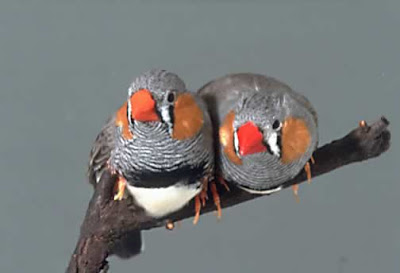
In order to keep your finches happy and healthy, you must do the following:
- Provide fresh, drinkable water daily (do not add antibiotics, vitamins, or disinfectants to the water)
- Make sure that there is ample, fresh food (e.g. a dish may appear to be full of seed, but may in fact contain only empty seed hulls)
- Clean the cage as it becomes dirty (including: perches, dishes, cage bottom, and nest)
- Disinfect the cage once per month with a properly diluted bleach solution or other suitable disinfectant
- Provide only fresh moist foods, and be sure to remove them after a period of about 4 hours to prevent the birds from eating spoiled/rotten foods
- Monitor your birds' droppings for color, consistency, amount of feces/urine/urates (any significant change should be suspicious)
- Do not place the birds in an area with heavy traffic, loud noises, etc. to prevent stress (as stress can help precipitate many health-related problems)
- Do not place your finches' cage within reach of a hooked-bill bird (such as a parrot), because they tend to be noisy and are capable of injuring finches easily
- Be careful to keep any pets that might disturb or harm the birds (such as bird dogs, rodents, snakes, and cats) away from the bird cage at all times!
- Regularly provide your birds with the opportunity to bathe by placing a wide, shallow dish filled about ¼" deep with water in their cage; make sure to keep the water clean since they will often drink out of the bowl
- Check the cage for any signs of bleeding (drops of blood on the perches), or feather loss that is not related to molting
- Observe the birds daily to make sure bickering is kept to a minimum and no finch appears sick
- Make sure your birds are receiving adequate, proper lighting
After all of this, if a bird still does become sick, isolate it immediately in a hospital cage (with fresh food and water in shallow dishes at the bottom of the cage placed within easy reach of the bird--do not give the bird grit or fruits and vegetables, but rather spray millet and seed which has been soaked in water for 24 hours then well rinsed), and provide ample heating (~90° F or 32° C) by using a heat lamp placed well above the cage (to prevent burns) or a heating pad wrapped around it. This way, the finch can use its own energy fighting off the illness and not trying to keep itself warm. Do not handle the bird extensively, examine it, or try to force feed it (unless absolutely necessary); instead, call an avian veterinarian for further assistance. Because birds are naturally great at hiding illness, when they appear sick they are usually seriously ill and do need veterinary care.
Signs that your finch may be sick are:
- Half closed eyes (acting "sleepy")
- Holding feathers away from the body ("fluffing up") for extended periods of time
- Sitting on the bottom of the cage
- Allowing you to handle them (lethargy)
- Swollen vent
- Feces or staining around the vent (due to diarrhea)
- Discolored/bloody feces, or other change in dropping appearance not due to dietary change
- Scaly feet
- Labored breathing (open mouth breathing, tail bobbing)
- Poor appetite
- Drooped wings
- Shivering
- Sudden weight loss
- Discharge from eyes, nares ("nostrils"), vent
- Abnormal growth of beak/nails
- Inability to fly
- Weakness

Post a Comment